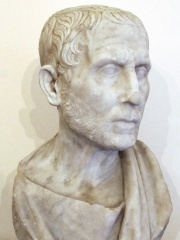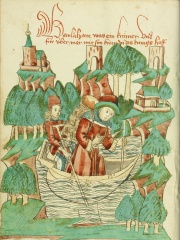

The Most Famous
PHILOSOPHERS from Turkey
This page contains a list of the greatest Turkish Philosophers. The pantheon dataset contains 1,267 Philosophers, 2 of which were born in Turkey. This makes Turkey the birth place of the 52nd most number of Philosophers behind Armenia, and Cyprus.
Top 2
The following people are considered by Pantheon to be the most legendary Turkish Philosophers of all time. This list of famous Turkish Philosophers is sorted by HPI (Historical Popularity Index), a metric that aggregates information on a biography’s online popularity.

1. Posidonius (-135 - -51)
With an HPI of 73.88, Posidonius is the most famous Turkish Philosopher. His biography has been translated into 51 different languages on wikipedia.
Posidonius (; Ancient Greek: Ποσειδώνιος Poseidṓnios, "of Poseidon") "of Apameia" (ὁ Ἀπαμεύς) or "of Rhodes" (ὁ Ῥόδιος) (c. 135 – c. 51 BC), was a Greek politician, astronomer, astrologer, geographer, historian, mathematician, and teacher native to Apamea, Syria. He was considered the most learned man of his time and, possibly, of the entire Stoic school. After a period learning Stoic philosophy from Panaetius in Athens, he spent many years in travel and scientific researches in Spain, Africa, Italy, Gaul, Liguria, Sicily and on the eastern shores of the Adriatic. He settled as a teacher at Rhodes where his fame attracted numerous scholars. Next to Panaetius he did most, by writings and personal lectures, to spread Stoicism to the Roman world, and he became well known to many leading men, including Pompey and Cicero. His works are now lost, but they proved a mine of information to later writers. The titles and subjects of more than twenty of them are known. In common with other Stoics of the middle period, he displayed syncretic tendencies, following not just the earlier Stoics, but making use of the works of Plato and Aristotle. A polymath as well as a philosopher, he took genuine interest in natural science, geography, natural history, mathematics and astronomy. He sought to determine the distance and magnitude of the Sun, to calculate the diameter of the Earth and the influence of the Moon on the tides.

2. Barlaam of Seminara (1290 - 1348)
With an HPI of 63.11, Barlaam of Seminara is the 2nd most famous Turkish Philosopher. His biography has been translated into 19 different languages.
Barlaam of Seminara (Bernardo Massari, as a layman), c. 1290–1348, or Barlaam of Calabria (Greek: Βαρλαὰμ Καλαβρός) was a Basilian monk, theologian and humanistic scholar born in southern Italy. He was a scholar and clergyman of the 14th century, as well as a humanist, philologist and theologian. When Gregorios Palamas defended Hesychasm (the Eastern Orthodox Church's mystical teaching on prayer), Barlaam accused him of heresy. Three Eastern Orthodox synods ruled against him and in Palamas's favor (two Councils of Sophia in June and August 1341, and a Council of Blachernae in 1351).
People
Pantheon has 2 people classified as Turkish philosophers born between 135 BC and 1290. Of these 2, none of them are still alive today. The most famous deceased Turkish philosophers include Posidonius, and Barlaam of Seminara.

